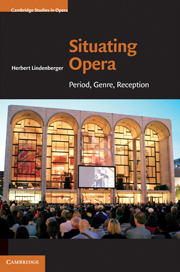Book contents
- Frontmatter
- Contents
- Acknowledgements
- Prologue
- 1 Anatomy of a warhorse: Il trovatore from A to Z
- 2 On opera and society (assuming a relationship)
- 3 Opera and the novel: antithetical or complementary?
- 4 Opera by other means
- 5 Opera and/as lyric
- 6 From separatism to union: aesthetic theorizing from Reynolds to Wagner
- 7 Toward a characterization of modernist opera
- 8 Anti-theatricality in twentieth-century opera
- 9 A brief consumers' history of opera
- Epilogue
- WORKS CITED
- Index
7 - Toward a characterization of modernist opera
Published online by Cambridge University Press: 05 August 2011
- Frontmatter
- Contents
- Acknowledgements
- Prologue
- 1 Anatomy of a warhorse: Il trovatore from A to Z
- 2 On opera and society (assuming a relationship)
- 3 Opera and the novel: antithetical or complementary?
- 4 Opera by other means
- 5 Opera and/as lyric
- 6 From separatism to union: aesthetic theorizing from Reynolds to Wagner
- 7 Toward a characterization of modernist opera
- 8 Anti-theatricality in twentieth-century opera
- 9 A brief consumers' history of opera
- Epilogue
- WORKS CITED
- Index
Summary
Modernist opera?
The terms we use to periodize opera are not necessarily the terms we use to characterize other forms of music. “Baroque opera,” a label attached to well over a century of works from Monteverdi through the early Gluck, belongs to the same category we apply to all the arts. But although the music of Mozart and Haydn is classified as marking the so-called Classical style, we do not readily speak of Don Giovanni or Die Zauberflöte as Classical operas. Yet we do speak of Romantic opera, but this, as mentioned earlier, is a relatively narrow term that suggests Weber and his successors up to early Wagner, and it is most often applied to German examples. Yet how do we bring the Germans together with their contemporaries Rossini, Bellini, and Donizetti? Better perhaps to keep the Italians by themselves and speak of the Age of Bel Canto, a period concept intrinsic to opera and not transferable to other music, let alone the other arts.
Modernist opera, however, is a concept that seems to have caught on, if only because the operas we see as “modernist” emanate from composers whom we have already classified with this term. Unlike their nineteenth-century predecessors, the modernist composers of opera were not primarily “opera composers.” Very few of the great nineteenth-century opera composers created significant oeuvres outside the opera house – the most notable exceptions being Beethoven, Berlioz, and Tchaikovsky.
- Type
- Chapter
- Information
- Situating OperaPeriod, Genre, Reception, pp. 174 - 195Publisher: Cambridge University PressPrint publication year: 2010



